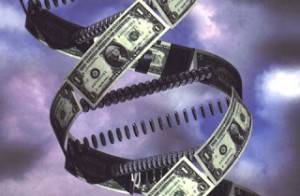Why the U.S. Supreme Court Should Allow Human Gene Patents
The law often deals with abstract and niche topics, but these cases can have profound effects on the average consumer. The Supreme Court will soon hear a patent case between Myriad Genetics and the ACLU. The issue is whether Myriad can establish patents on two human genes associated with breast and ovarian cancer. The US patent office has been giving patents on genes and other human material for decades now, but that practice may end this June, when the Supreme Court makes its decision.
 Myriad argues that the patents are necessary to guarantee innovation. Since patents keep other people from making, distributing or offering for sale the patent holder’s invention, investors are more motivated to innovate since the inventor will see real profits from his invention. Investments and loans are also more likely to come since the likelihood of high profits is great if the scientific discovery is highly sought. Although patents cannot be applied to natural products, such as human organs, removing human genes from DNA makes it a new object entirely. Eggs and sugar, for example, are natural products which cannot be patented, but when combined in specific amounts at specific times, the resulting recipe becomes a new product which belongs to the owner. It is not the cake (the end product) but the recipe (the process to make the cake) which is owned and thus should be protected by patents.
Myriad argues that the patents are necessary to guarantee innovation. Since patents keep other people from making, distributing or offering for sale the patent holder’s invention, investors are more motivated to innovate since the inventor will see real profits from his invention. Investments and loans are also more likely to come since the likelihood of high profits is great if the scientific discovery is highly sought. Although patents cannot be applied to natural products, such as human organs, removing human genes from DNA makes it a new object entirely. Eggs and sugar, for example, are natural products which cannot be patented, but when combined in specific amounts at specific times, the resulting recipe becomes a new product which belongs to the owner. It is not the cake (the end product) but the recipe (the process to make the cake) which is owned and thus should be protected by patents.
The ACLU sees little distinction between owning the process of removing the gene and owning the gene itself. If a kidney is removed from a human body, the kidney does not become a new entity. The kidney is not distinct from the body it came from, and neither should a gene. Genes naturally come from the human body and natural products cannot be patented. Claiming to own something which belongs to every human is neither moral nor legal.
Before the ACLU can claim victory though, the practical consequences should be considered. The patent system exists to encourage innovation. By giving a monopoly to new inventions, individuals are encouraged to innovate and investors are encourages to invest in these attempts to make new products. Since the first company to get it patented will maintain the monopoly, competition is about speed as much as quality. Multiple companies will work on an idea, and then race to get it patented. The United States has led the world in scientific innovation partly because the patient system creates great incentives for scientific innovation.
The price of the current patent system is not that it strangles competition, but that it strangles the free market for consumers. The patent system rewards innovation, but once that innovation is achieved it is not widely dispersed to those most in need. The patent system creates a bottleneck that prevents many consumers from getting much needed medical treatment. A treatment for a disease could be created quickly, because the company would see massive returns for its accomplishments.
The reward, however, is exactly the problem. The company, with its monopoly, can charge whatever prices it wants, without fear of a rival charging lower prices. It is the consumer who bears the burden of the patent system and it was the patent system which contributed to the rise of the healthcare system.
The Supreme Court should consider the practical implications by retaining the patent system. It is Congress which has the power to alleviate the problem by lowering the number of years the patent is applicable to the human genome project. Moral considerations should be left to the branch of government charged with deciding policy. It is possible that massive companies could buy out Congress, but if an issue is actually about morality, than the democratic process should be able to prevail.


Comments